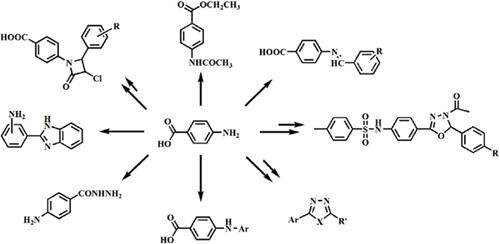Mini-Reviews in Organic Chemistry ( IF 1.9 ) Pub Date : 2020-08-31 , DOI: 10.2174/1570193x16666190828201234 Zaib Un Nisa 1 , Tashfeen Akhtar 1

|
PABA (p-aminobenzoic acid) is an important substrate for the synthesis of various biological scaffolds. Its pharmacological significance is apparent form the drugs like folic acid and benzocaine, which are used for certain biological disorders. Although, it is not a vitamin but still it is referred as a member of vitamin B. The deficiency of PABA leads to several disorders like erratic white areas of skin, grey hair, fatigue, depression and irritability. Besides its medicinal importance, PABA has been used in the synthesis of various biologically active heterocyclic nuclei like benzimidazoles, azitidinones, thiazolidinones, pyrazoline, etc. This review will describe the applications of PABA in the synthesis of these biologically active nuclei and hence emphasizing its importance as a versatile substrate.
中文翻译:

对氨基苯甲酸-A底物意义重大
PABA(对氨基苯甲酸)是合成各种生物支架的重要底物。从用于某些生物学疾病的药物如叶酸和苯佐卡因可以明显看出其药理学意义。虽然它不是维生素,但仍被称为维生素B的一种。PABA的缺乏会导致多种疾病,如皮肤白斑发白,白发,疲劳,抑郁和易怒。除了其医学重要性外,PABA还用于合成各种生物活性杂环核,如苯并咪唑,氮杂环丁酮,噻唑烷酮,吡唑啉等。本综述将描述PABA在这些生物活性核的合成中的应用,因此强调其重要性作为通用基材。






























 京公网安备 11010802027423号
京公网安备 11010802027423号